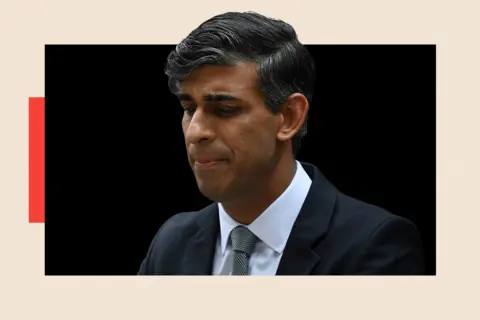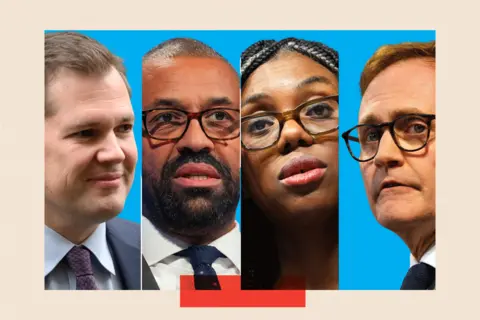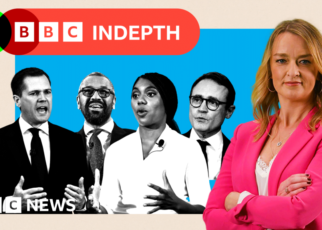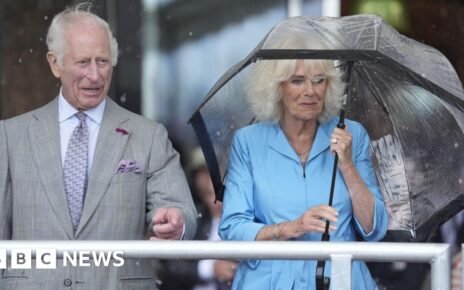[ad_1]
 BBC
BBC“They all know it is the moment of truth.”
By Wednesday afternoon the Conservatives should be a lot closer to knowing who their next leader will be – and the party’s conference in Birmingham, which starts on Sunday, is a huge and very public job interview.
The common view among Tories I’ve spoken to is that none of the candidates – Robert Jenrick, James Cleverly, Kemi Badenoch and Tom Tugendhat – have dazzled, and one senior Tory describes the contest so far as “ponderous and lacklustre”.
But there’s also the sense that it’s “wide open,” says another senior Conservative.
They all still have multiple chances to impress – or disappoint.
A Cameron-style speech?
First, on Sunday with Laura Kuenssberg, we’ll kick off with interviews with Kemi Badenoch and Robert Jenrick (we have already spoken to the other two in recent weeks, you can watch those chats back here).
Next they’ll each be interviewed in the conference hall on Monday and Tuesday – a half-hour grilling followed by questions from the audience.
In the fringes, away from the public glare, the four are expected to attend at least twenty events – panel discussions, Q&As and a blizzard of press interviews.
Then their biggest test comes on Wednesday: a 20-minute speech that could make or break their leadership bid.
“They’re all hoping to do the barnstorming speech that makes people feel, wow, that’s definitely the person’,” says a former minister – to “do a Cameron“.
That’s a reference to 2005, when the Tories had been in opposition for years and the well known MP David Davis, a former minister, looked like the obvious new leader.
But suddenly, young shadow education secretary David Cameron – who I remember catching having a nervous smoke outside before his speaking slot – turned all that on its head.
 Getty Images
Getty ImagesHis team had worked out he spoke more fluently and persuasively without autocue or a formal script, and he took only a few scribbled notes on the lectern. He wandered freely round the stage, telling the party it had failed and had to change from tip to toe.
It was a huge gamble – and he blew the crowd away.
Who’ll do it this time, whether they use notes or not?
The general consensus in the party talking to multiple sources is that the front runner is Jenrick, the former immigration minister who quit government under Rishi Sunak.
Badenoch, the former business secretary is close behind him.
They are both now regarded as being on the right of the party, generally considered to be the comfort zone for the party’s members – “they’re not headbangers, they’re just both uber ambitious,” says the senior figure who’s been somewhat impressed by both of them.
The backers of the other two trailing – Cleverly and Tugendhat, both more from the party’s centre – seem to think one will be booted out next round leaving the other to eat up their support and overtake both Jenrick and Badenoch.
 Getty Images
Getty ImagesWe’ll find out who makes the final two by 10 October, with the winner unveiled on 2 November following an online ballot of members.
Right now, it’s fair to say that none of the candidates is causing wild excitement. And, as it’s politics, especially Tory politics, there is a lot of disobliging chatter about each one.
Jibes heat up
Jenrick has impressed plenty of Conservatives with a well organised campaign, (surely he wasn’t planning it before the election I hear you cry?), and the consensus is that he’s outperformed the others in that sense.
Yet a colleague describes him as an “affable boring Midlands bank manager”, while another jibes: “If the country had to draw a Tory, they’d draw him, that’s a problem for our stereotype.”
Meanwhile, a former cabinet minister says “you can see the allure of Kemi” – and another stresses that “she has stage presence”. Badenoch has attracted some backers with unusual zeal – one donor tells me she’s gained “some evangelical followers” but has run a “sub-par campaign”.
And another of her former colleagues in government says “she could start a fight in an empty room” – plain speaking is one thing, but politics is not only a game of attack.
What then of Cleverly? One senior source says the former home secretary and ex-foreign secretary “has the biggest chance of doing what needs to be done in terms of uniting right and left”. He’s seen as a reliable media performer and “safe pair of hands” in many minds.
Yet others who sat alongside him around the cabinet table say “he’s a bit of a blank,” unclear what he would really offer to the job. The jibe another offers is simply: “The criticism of Cleverly is always whether he is really that clever.”
Then there is Tugendhat – “now or later, he is the best person to have, we can only win from the centre,” another former minister says. The source points to polling that suggests he’d have a broader appeal.
Even those sympathetic to his cause worry he’s not impressed in the campaign, though. One of his backers says “he hasn’t thrown much energy into the campaign… he is the outsider and unless he makes a spectacular success and shoots the lights out at the conference he won’t make it.”
For some observers the problem isn’t how the campaigns have been run, it’s that the Conservatives’ next possible Prime Minister isn’t even in the race. As one source joked, this person is “probably still at school”.
One former member of Sunak’s cabinet recalls how “we used to go round the table and try to look for the next leader – we’d be on our second way round then realise, there simply wasn’t one”.
But find a leader they must, and given the Labour government’s early shaky performance – with rows over winter fuel payments, freebies and so on – some party insiders think the future is far less bleak than it seemed on the morning of 5 July. A party donor says: “I thought we were done – but it doesn’t look like that now.”
Whoever wins in the end will have an absolutely enormous task. Aside from sorting out party HQ and raising cash, there’s the small matter of winning over the electorate and reclaiming ground from Reform, following the Tories’ worst election defeat in its parliamentary history. As a former Cabinet minister says: “They’ll have to be better than Starmer, better than Davey, and better than Farage.”
Before all that, do not underestimate the importance of ditching the Tories’ years-long habit of behaving as if their deadliest enemies were in their own party. A senior figure says: “Let’s not forget we deserved the drubbing. We have been rubbish in government and rubbish as a party spending our time fighting each other.”
Whoever triumphs over the next five days, winning over their party might prove to be the easiest part.


BBC InDepth is the new home on the website and app for the best analysis and expertise from our top journalists. Under a distinctive new brand, we’ll bring you fresh perspectives that challenge assumptions, and deep reporting on the biggest issues to help you make sense of a complex world. And we’ll be showcasing thought-provoking content from across BBC Sounds and iPlayer too. We’re starting small but thinking big, and we want to know what you think – you can send us your feedback by clicking on the button below.
[ad_2]
Source link freeslots dinogame telegram营销




